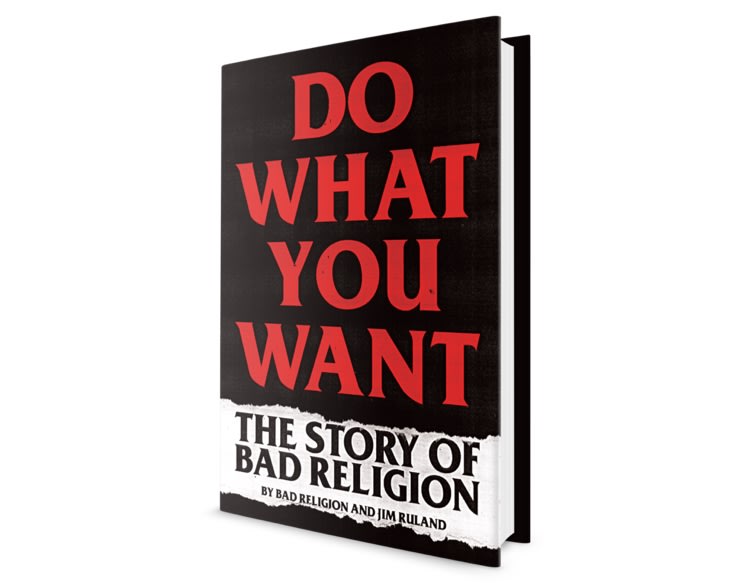Forty years is a long life for any band, let alone one who've had as many ups and downs as Bad Religion. Through break-ups, addiction, major-label success and failure and one deeply ill-advised stylistic diversion, the Los Angeles quintet have persevered, becoming the standard bearers for a style of melodic skate punk that's celebrated across the globe.
Yet it took until now for the band to tell their tumultuous story. Working primarily from interviews with core group members Greg Graffin, Brett Gurewitz, Jay Bentley and Brian Baker, co-author Jim Ruland starts Do What You Want at the band's ignoble teenage beginnings in the often-violent L.A. punk scene. The band released their now-classic debut, How Could Hell be Any Worse?, and its rarely discussed, progg-y follow-up, Into the Unknown, before going their separate ways. For a while, punk as a whole seemed to be well and truly dead, and listening to records from this period reveals a conscious move to a harder, thrash metal sound for many punk bands. However, when the band quickly reformed, now with Circle Jerks guitarist Greg Hetson in the lineup, things really started to take off for both the band and California punk in general.
Starting with 1988's Suffer, the band, backed by Gurewitz's own Epitaph label, began producing classic LPs at quick clip. By 1993, they'd rode a wave of interest in underground music to a deal with Atlantic Records, a move that would prove a bridge too far for Gurewitz, who was simultaneously managing Epitaph's explosive growth and sliding back into drug addiction. Despite strong sales and warm critical reception for Stranger Than Fiction and The Grey Race, when their deal with the major label came to a sputtering end at the turn of the millennium, they've found a triumphant third life back on Epitaph as elder statesman of a scene that they helped create.
Understandably, the story of Epitaph itself, which could (and should) be its own book, is discussed only in relation to Bad Religion. And throughout the book, we see the world exclusively through the eyes of the band members. Ruland spends little time ruminating on the L.A. scene that spawned them, and many of the band's former members, friends and acquaintances are given little (or no) space to share their own views. It creates a frustratingly myopic point of view, one with a razor-sharp focus on the band with personal lives backgrounded.
It's a 180 from the autobiography the members of NOFX — peers and one-time members of the Epitaph roster — released in 2016. That book was shocking for how little it held back, with members spilling their guts on the page, often surprising even each other. Instead, Do What You Want, feels impersonal and overly "PR-ed."
Still, fans will find much to like here. Even in its sanitized state, Bad Religion's story is fascinating, and their influence casts a long shadow over the punk bands that have come after. In many ways Do What You Want is like any new Bad Religion record: you more or less know what you're getting, but that doesn't mean that it isn't satisfying and even, at times, invigorating.
(Hachette)Yet it took until now for the band to tell their tumultuous story. Working primarily from interviews with core group members Greg Graffin, Brett Gurewitz, Jay Bentley and Brian Baker, co-author Jim Ruland starts Do What You Want at the band's ignoble teenage beginnings in the often-violent L.A. punk scene. The band released their now-classic debut, How Could Hell be Any Worse?, and its rarely discussed, progg-y follow-up, Into the Unknown, before going their separate ways. For a while, punk as a whole seemed to be well and truly dead, and listening to records from this period reveals a conscious move to a harder, thrash metal sound for many punk bands. However, when the band quickly reformed, now with Circle Jerks guitarist Greg Hetson in the lineup, things really started to take off for both the band and California punk in general.
Starting with 1988's Suffer, the band, backed by Gurewitz's own Epitaph label, began producing classic LPs at quick clip. By 1993, they'd rode a wave of interest in underground music to a deal with Atlantic Records, a move that would prove a bridge too far for Gurewitz, who was simultaneously managing Epitaph's explosive growth and sliding back into drug addiction. Despite strong sales and warm critical reception for Stranger Than Fiction and The Grey Race, when their deal with the major label came to a sputtering end at the turn of the millennium, they've found a triumphant third life back on Epitaph as elder statesman of a scene that they helped create.
Understandably, the story of Epitaph itself, which could (and should) be its own book, is discussed only in relation to Bad Religion. And throughout the book, we see the world exclusively through the eyes of the band members. Ruland spends little time ruminating on the L.A. scene that spawned them, and many of the band's former members, friends and acquaintances are given little (or no) space to share their own views. It creates a frustratingly myopic point of view, one with a razor-sharp focus on the band with personal lives backgrounded.
It's a 180 from the autobiography the members of NOFX — peers and one-time members of the Epitaph roster — released in 2016. That book was shocking for how little it held back, with members spilling their guts on the page, often surprising even each other. Instead, Do What You Want, feels impersonal and overly "PR-ed."
Still, fans will find much to like here. Even in its sanitized state, Bad Religion's story is fascinating, and their influence casts a long shadow over the punk bands that have come after. In many ways Do What You Want is like any new Bad Religion record: you more or less know what you're getting, but that doesn't mean that it isn't satisfying and even, at times, invigorating.
